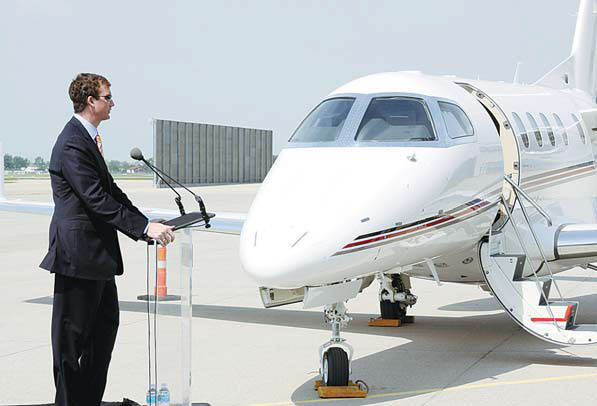US business-jet company awaits green light to start China operations
Fewer than 300 privately owned jets are authorized for flight in China, and in August NetJets, which American billionaire Warren Buffett acquired after being a customer for three years, is looking to become basically an air-taxi service for China's wealthy and corporate customers.
"We firmly believe that China is an important growth market for private aviation," NetJets spokesman Tom Hoyt says.
August is when the subsidiary of Buffett's Berkshire Hathaway Inc is expecting to get final approval for its operating certificate from the Civil Aviation Administration of China, company CEO Jordan Hansell told The Wall Street Journal earlier.
|
Business-jet specialist NetJets CEO Jordan Hansell speaking at a launch event in Florida. NetJets plans to begin operations in China in August. Provided to China Daily |
Founded in 1964, the Ohio-based NetJets offers rental of business jets, as well as fractional ownership by which a customer buys a share of a plane rather than the entire aircraft, paying to have the use of a plane each year for certain number of hours.
In addition to offering fractional ownership of a jet and charter services, the company will manage aircraft for individual owners and companies, providing such services as hangaring, maintenance, insurance and cleaning, NetJets says.
In 2012, NetJets launched a Chinese joint venture, the NetJets China Business Aviation Ltd, with Chinese investors Hony Jinsi Investment Management (Beijing) and Fung Investments.
The joint venture allows NetJets to provide charter service and aircraft management in China.
Plane manufacturers and others are seeking entry into China, which is steadily growing while still small compared to those in developed economies like the United States.
"I think that interest has really begun to increase as China has been emerging as a global economic center," says Dan Hubbard, a spokesman for Washington-based National Business Aviation Association, an industry organization representing aviation companies.
"Cities like Shanghai are now starting to take their place alongside other financial centers, like London or New York or Geneva, and as that progression has been happening, you see the progression in business aviation tracking that growth," he says.
Gulfstream Aerospace Corp, a business-jet manufacturer based in Georgia that has a 65 percent market share of the private-jet market in China, has seen its fleet in China grow fourfold over the last five years.
It delivered its first aircraft to China in 2003 and has more than 130 planes at mainland, Hong Kong, Macao and Taiwan today.
Gulfstream announced in April that it had signed an order for 60 aircraft with the Minsheng Financial Leasing Co, one of the largest in Gulfstream history.
The Chinese financial institution's order included the super mid-size G280, which costs $24.5 million, as well as the G650, priced at $64.5 million.
Hubbard estimates that there are about 14,000 owners in the US - either individuals or corporations - owning about 12,000 business aircraft, but only a couple of hundred in China.
Steve Cass, spokesperson for Gulfstream, said: "I think what people are beginning to realize is that they really are becoming business tools that allow them to be more productive.
"The world economy is a global economy, so the need to travel all around the world where your business is expanded, it's imperative."
The Chinese government has taken steps to loosen control on airspace, announcing in November last year that it would simplify flight-approval procedures for general aviation aircraft, which are often business-related planes.
To file a flight plan, which is required for flying a business aircraft, an individual had to apply days ahead, which negates the value of flying a business jet, NBAA's Hubbard says.
"Business aviation is an asset to a company largely because you can decide on a moment's notice to go somewhere to pursue an opportunity or to get in front of a customer, or to conduct a meeting or visit a branch office for managerial reasons," Hubbard says.
"You can do all of that in the United States and in many countries on a last minute, spur-of-the-moment basis, whereas in China you really couldn't. So that drains the asset of a lot of its value."
China has indicated in its 12th Five-Year Plan (2011-15) that it will begin implementing policies to make its aviation system more flexible.
"They're interested in it in deed and not just in word," Hubbard says.
"When we host delegations from China, what the Chinese want to know is, 'What should we be looking at? What can we do to try to foster this so that we have an asset in China that you clearly have and benefit from in the US?'"
amyhe@chinadailyusa.com



















